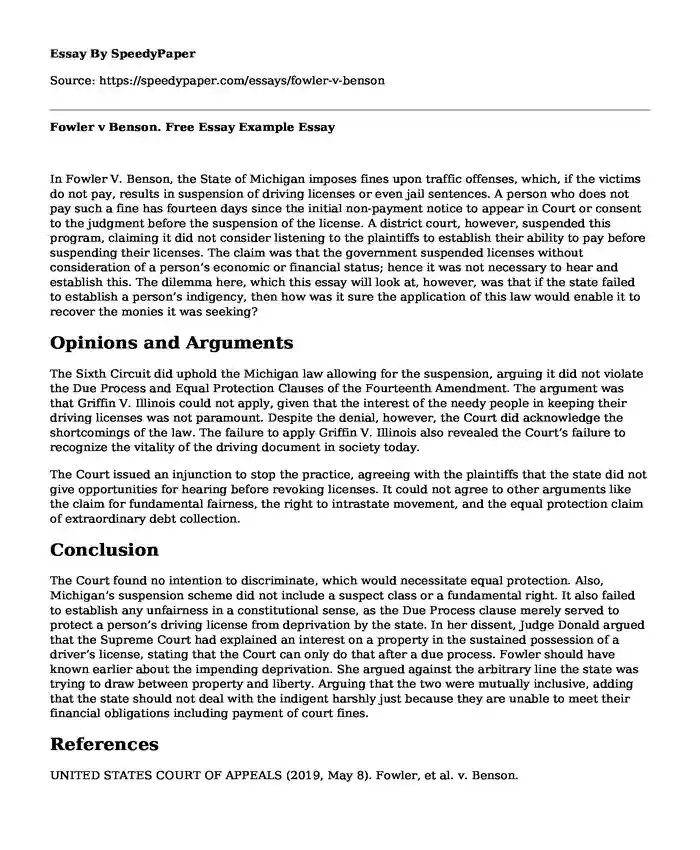
| Type of paper: | Essay |
| Categories: | Government Court system Judicial system Essays by wordcount |
| Pages: | 2 |
| Wordcount: | 465 words |
In Fowler V. Benson, the State of Michigan imposes fines upon traffic offenses, which, if the victims do not pay, results in suspension of driving licenses or even jail sentences. A person who does not pay such a fine has fourteen days since the initial non-payment notice to appear in Court or consent to the judgment before the suspension of the license. A district court, however, suspended this program, claiming it did not consider listening to the plaintiffs to establish their ability to pay before suspending their licenses. The claim was that the government suspended licenses without consideration of a person’s economic or financial status; hence it was not necessary to hear and establish this. The dilemma here, which this essay will look at, however, was that if the state failed to establish a person’s indigency, then how was it sure the application of this law would enable it to recover the monies it was seeking?
Opinions and Arguments
The Sixth Circuit did uphold the Michigan law allowing for the suspension, arguing it did not violate the Due Process and Equal Protection Clauses of the Fourteenth Amendment. The argument was that Griffin V. Illinois could not apply, given that the interest of the needy people in keeping their driving licenses was not paramount. Despite the denial, however, the Court did acknowledge the shortcomings of the law. The failure to apply Griffin V. Illinois also revealed the Court’s failure to recognize the vitality of the driving document in society today.
The Court issued an injunction to stop the practice, agreeing with the plaintiffs that the state did not give opportunities for hearing before revoking licenses. It could not agree to other arguments like the claim for fundamental fairness, the right to intrastate movement, and the equal protection claim of extraordinary debt collection.
Conclusion
The Court found no intention to discriminate, which would necessitate equal protection. Also, Michigan’s suspension scheme did not include a suspect class or a fundamental right. It also failed to establish any unfairness in a constitutional sense, as the Due Process clause merely served to protect a person’s driving license from deprivation by the state. In her dissent, Judge Donald argued that the Supreme Court had explained an interest on a property in the sustained possession of a driver’s license, stating that the Court can only do that after a due process. Fowler should have known earlier about the impending deprivation. She argued against the arbitrary line the state was trying to draw between property and liberty. Arguing that the two were mutually inclusive, adding that the state should not deal with the indigent harshly just because they are unable to meet their financial obligations including payment of court fines.
References
UNITED STATES COURT OF APPEALS (2019, May 8). Fowler, et al. v. Benson.
Retrieved from https://www.opn.ca6.uscourts.gov/opinions.pdf/19a0086p-06.pdf
Cite this page
Fowler v Benson. Free Essay Example. (2023, Aug 09). Retrieved from https://speedypaper.net/essays/fowler-v-benson
Request Removal
If you are the original author of this essay and no longer wish to have it published on the SpeedyPaper website, please click below to request its removal:
- Free Essay Sample on Kali Linux Security Features
- Explanations of How Love Crosses Class Lines - Free Paper with the Article Analysis
- Sociology and Education - Free Essay Sample
- Scientific Writing for Expert audience: Assignment scoring criteria
- Free Essay on COPD Disease
- Free Essay Example - Geographical area
- Paper Example. Enlightenment Philosophes
Popular categories




